Given below are the events of photosynthesis. Identify which of the following is/are not true and select the correct option.
Absorption of light energy by chlorophyll.
Conversion of light energy to chemical energy and splitting of carbon dioxide into carbohydrates and oxygen.
Reduction of carbon dioxide to carbohydrates.
Conversion of chemical energy to radiant energy and splitting of water molecules into hydrogen and oxygen.

Important Questions on Life Processes
Which of the following statements are correct regarding the given figure?
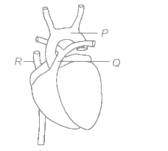
(i) The parts labelled as Q and R carry blood having low oxygen concentration.
(ii) The parts labelled as P, Q and R carry blood having low oxygen concentration.
(iii) The blood flows out of the heart through blood vessel Q when ventricle contracts.
(iv) The blood is flowing out of the heart through blood vessel Q when atria contract.
The given graph shows changes in the air pressure of lungs during breathing. What causes the change in air pressure during period X?
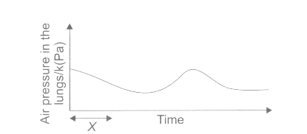
The given graph shows the changes in the volume of the lungs of a person at rest over a period of 20 seconds.
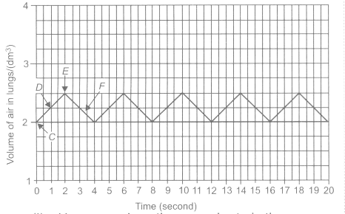
How many breaths per minute is the person taking when at rest?
Which two points in the graph (C, D, E or F), shows inspiration and expiration?
The thyrotropin releasing hormone (TRH) from the stimulates the to secrete the thyroid stimulating hormone (TSH), which in turn stimulates the thyroid gland to secrete thyroxine. A amount of thyroxine in the blood exerts effect on so that TRH and TSH are produced. This eventually the amount of thyroxine. It is called feed back control.
Select the option that correctly fills up the blanks in the above passage.Refer to the following figure of phloem tissue.
Which of the following statements correctly describes the relationship between cells Y and Z?
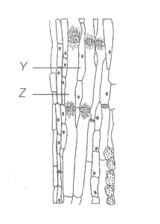
The diagram shows a model of a nephron and its associated blood vessels.
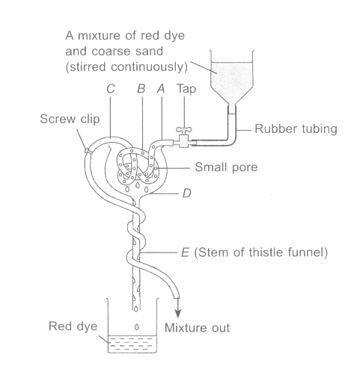
This model has been criticised for being a poor representation of a nephron. Which of the following statements explain(s) this?
(i) The rubber tubing at is not split up into numerous branches like the capillary network of the glomerulus.
(ii) The rubber tubing at should be continuous and not contain small pores.
(iii) The stem of the thistle funnel is not coiled to represent the convoluted tubules of the nephron.
